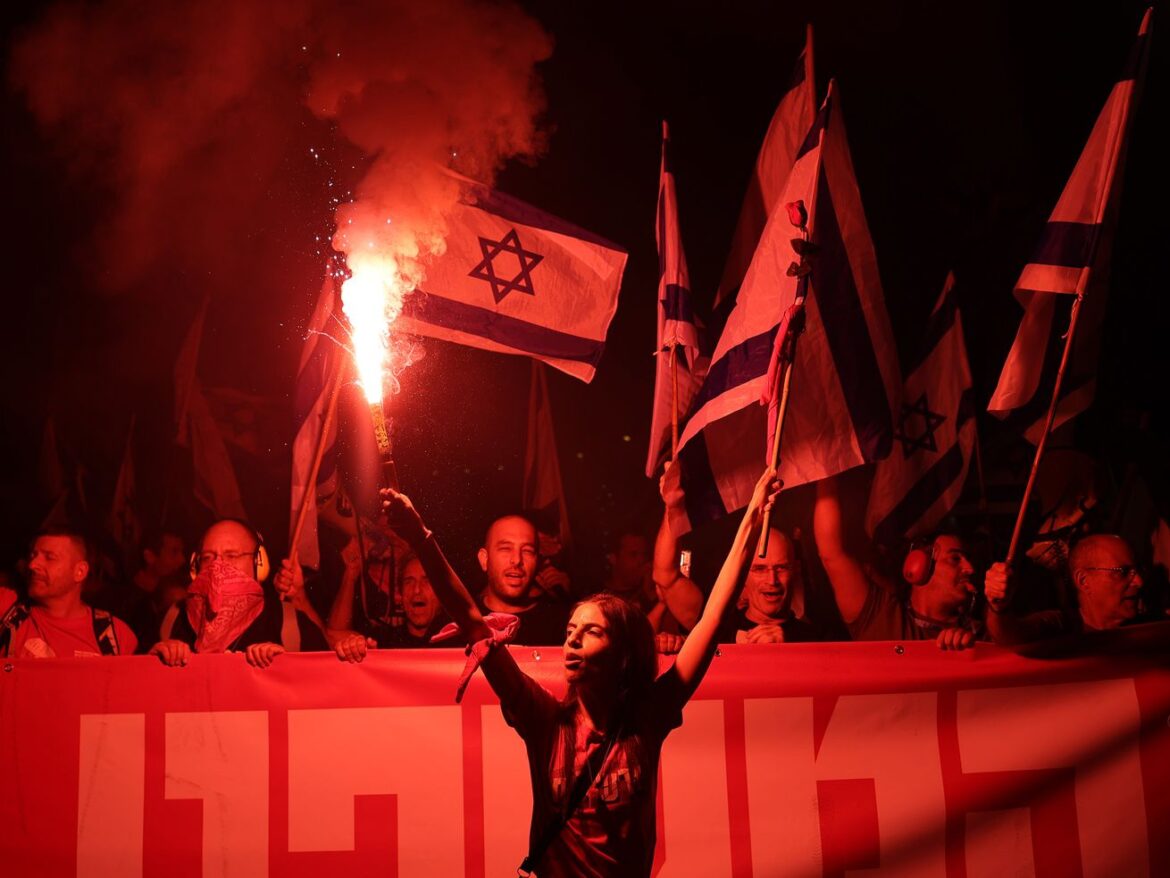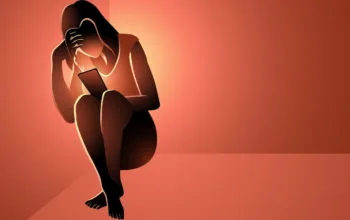The history behind Israel’s democratic crisis, explained.
The Israeli Supreme Court is currently hearing arguments in a landmark case about itself.
At issue is the first law passed in Prime Minister Benjamin Netanyahu’s judicial overhaul package — a new limitation on the court’s ability to overturn decisions made by Netanyahu and his cabinet it finds “extremely unreasonable.” This may sound like a small technocratic dispute, but in fact, the fundamental nature and even survival of Israeli democracy is at stake. There’s a reason Netanyahu’s overhaul has spawned the largest protest in Israeli history: The attack on the court is seen, by millions of Israelis, as an attack on Israeli democracy itself.
“Absolute power corrupts absolutely, and while this government may not abuse its power, when the power is there, it will be used,” Aner Helman, the lawyer representing Israel’s attorney general, said in Tuesday’s hearing while arguing the new law should be overturned. Helman’s argument was notable not only for its seriousness, but also for the fact that he is a government attorney who typically defends its policies in court.
To understand how the judiciary became the policy issue in Israeli politics, one potent enough to turn core state institutions against each other, you need to understand a series of profound and overlapping tensions in Israeli Jewish society — divisions between the religious and the secular, between the right wing and the center left, and between Netanyahu and the country’s traditional political establishment. All of these tensions are connected to perhaps the central philosophical question of Israeli politics: What does Israel’s core legal identity as a “Jewish and democratic” state mean?
For years, it seemed possible that this fundamental issue could be worked out within the confines of the existing political and legal system. But the rise of the Israeli far right in the past two decades, and Netanyahu’s fateful decision to join ranks with them, pushed things well outside “normal” political parameters. The court is the last institutional bulwark standing in the way of a series of far-right initiatives on everything from the Palestinian conflict to the role of religion in public life. The far right wants to smash through this guardrail, and has the votes in the Knesset (Israeli parliament) to do so.
Many specific developments in Israeli politics, ranging from controversial Supreme Court rulings to Netanyahu’s trial on corruption charges, came together to make the attack on the court possible. A democratic “perfect storm” created a unique opportunity for the right to permanently resolve the central dilemma of Israeli politics on their terms — and galvanized those committed to alternative visions of Israel to fight for a court they see as their last best hope.
This week’s case, then, is not just about a specific judicial power. It is part of a bigger fight over whether the right will be allowed to continue redefining the Israeli state along illiberal and anti-democratic lines — and whether the Supreme Court is willing to risk a constitutional crisis to stop them.
The conflicts at the heart of Israeli identity
Israel does not have a formal constitution. Instead, it has what are called “Basic Laws” — laws that create a kind of constitution-lite amendable by a simple majority vote in the Knesset. The current crisis stems from a new Basic Law, passed this June, that eliminates courts’ power to overturn decisions by Israel’s cabinet or its ministers that they find to be “extremely unreasonable” — meaning decisions that the government can’t prove were made according to some basic standards of fair and just policymaking.
Such a standard for judicial review might seem overbroad in the United States. But it’s actually relatively common internationally, and Israel in particular has a need for it given that it has no constitution, no federal system, and no separation of executive and legislative powers. The courts are basically the only check on decisions made by the elected government — and the current government, a far-right coalition led by Prime Minister Benjamin Netanyahu, is trying to weaken the judiciary’s powers and pack the courts with ideologically friendly jurists.
At issue in this week’s case, in part, is whether the court can do something it’s never done before: overturn a new Basic Law on grounds that it conflicts with other Basic Laws. The issue is not just whether this one change to the law is defensible. It’s an existential question of how the basic contours of the Israeli political system are to work.
To understand just why the stakes have gotten so high, it’s necessary to dwell on the definition of the state as both “Jewish and democratic” — which is not only a guiding vision for the state but also an identity legally inscribed in the Basic Laws.
The idea, at least in theory, is that Israel is supposed to be at once a distinctly Jewish state and a democratic state founded on liberal ideas of equality and human rights.
“Compatibility between the democratic and Jewish-Zionist character of the state is a cornerstone in the ideology of all Zionist political parties in Israel and the opinion of the overwhelming majority of the Jews,” the Israeli sociologist Sammy Smooha argued in the late 1990s (while noting that “from this Jewish consensus, ultra-nationalists dissent.”)
In practice, Smooha argues, there are obvious tensions between these two prongs of its self-identity — ones inherent to the “Jewish and democratic” concept itself and thus evident since the state’s creation.
One of Israel’s foundational aims is to serve as a homeland for Jews around the world and a refuge for those facing persecution. As such, Israeli immigration policy allows for Jews anywhere to move to Israel and become a citizen. But the same immigration rights are not extended to anyone who isn’t Jewish. Ethnoreligious discrimination is, by design, a central part of Israeli immigration law.
It gets thornier. The question of what it means to be a “Jewish” state is contested, to put it mildly. Religious extremists believe the government should be based on halakah (Jewish law), while staunch secularists believe the Israeli state should play no role at all at in strictly religious matters. Most Israeli Jews fall somewhere along that spectrum, leading to bitter fights on a series of specific policy questions (like whether public transportation should be open on Shabbat).
There’s also the critical question of non-Jewish citizens.
After the Israeli War of Independence, the Arab Palestinian population that remained inside its borders were granted citizenship but put under martial law — a not-very-democratic legal arrangement that remained in place until 1966. Today, Arab citizens make up around 20 percent of the population, and are subject to frequent discrimination in areas like housing and policing. And that’s to say nothing of the authoritarian military occupation that noncitizen Palestinians live under in the West Bank.
/cdn.vox-cdn.com/uploads/chorus_asset/file/24918891/1581702086.jpg)
Mostafa Alkharouf/Anadolu Agency/Getty Images
For this reason, Smooha argues that Israel is a very particular kind of democracy: an “ethnic democracy” that “combines the extension of civil and political rights to individuals and some collective rights to minorities with institutionalization of majority control over the state.” Such a state is split between the “democratic principle,” which prioritizes “equal rights and equal treatment of all,” and the “ethnic principle,” which prioritizes “fashioning a homogenous nation-state and privileging the ethnic majority.”
Managing this tension is difficult both philosophically and legally. There will always be specific cases that push the limits of what the laws, Basic or otherwise, have set as legal standards for managing Israel’s dual identity.
This means Israel’s courts are, by necessity, regularly called upon to make judgments about the most fundamental issues surrounding the nature of Israeli state and society. While courts in every country make controversial decisions, few face the kind of existential questions about the country’s survival and purpose that Israel’s do.
As a result, the court’s judgments were bound to attract anger from the losing side in major cases — ones that might lead them to attack the institution itself. In fact, that’s been happening since the state’s earliest days.
The long history of struggle over the courts
In a 2021 paper on the history of political conflict over the court system, Israeli scholar Dahlia Scheindlin finds an almost immediate post-independence conflict between secular and ultra-Orthodox Israelis about the proper role of the judiciary — to the point where Israel’s leading rabbis actually boycotted the opening ceremonies for the Supreme Court in 1948.
“For certain groups in society, there has never even been full agreement over the role and authority of civil law versus religious law. In turn, the institutions of justice have been flashpoints of tension from the earliest years of statehood — and none more than the Supreme Court,” Scheindlin finds.
After Israel seized the West Bank and Gaza Strip in the 1967 Six-Day War, the country was faced with a whole new set of legal questions surroundings its military occupation of those lands. These, too, implicated fundamental questions of Israeli identity. What lands, exactly, should constitute its final borders? Should biblical descriptions of ancient Jewish land have any authority over present-day policy? And how could Israel be a democracy of any kind when it ruled over a Palestinian population who would never be permitted the rights of citizens?
The settlement enterprise — a campaign by religious nationalist Israelis to establish towns designed to cement control over Palestinian land, aided and abetted by the government — forced the court to weigh in on these weighty disputes. Typically, the court deferred to the the settlers, especially when the government claimed that establishing settlements in a particular area was a matter of national security.
But in 1979, the court ruled that a new settlement called Elon Moreh could not be justified on any legal grounds, security or otherwise. It ordered that the settlement be moved. The settlers were furious, with their spokespeople almost immediately calling for political war on the legal system.
“We must create a team of jurists for whom the matter of settlements is close to their hearts, in order to solve legal problems and prevent mishaps,” one said. “If democracy begins to interfere with the building of a Jewish state, we must give up democracy,” said another.
/cdn.vox-cdn.com/uploads/chorus_asset/file/24918898/53023408.jpg)
Chanania Herman/GPO/Getty Images
The political resentment of both groups, the ultra-Orthodox and the settlers, became supercharged in the 1990s — the decade where it seemed most likely that the Israeli state might settle on a more liberal answer to the Jewish/democratic tension.
In 1992, the Knesset enacted two new Basic Laws that significantly expanded the scope of Israeli protections of individual rights. Protections for “human dignity” and “liberty,” specifically included “to embed the values of the State of Israel as a Jewish and democratic state in a basic law,” created significant grounds for courts to declare legislation at odds with the Basic Law.
Supreme Court Justice Aharon Barak declared this to be a “constitutional revolution.” In the following years, the court would rule that the the new Basic Laws included a fundamental right to equality for all Israelis, an idea that struck at the heart of both the ultra-Orthodox and settler visions for the state. A state that protects equality cannot privilege one ethnoreligious group in the institutionalized way these groups believed it should.
Not coincidentally, this constitutional revolution happened at the same time as the Oslo peace process with the Palestinians. The agreements, which set up the Palestinian Authority as a temporary self-rule mechanism until a final peace agreement could be reached, threatened to destroy the settlement enterprise altogether.
It hasn’t played out that way: The occupation of Palestinian land is now so entrenched that leading human rights groups have described the situation as a form of apartheid. But at the time, the Israeli state seemed on the verge of moving its “ethnic democracy” in a more liberal direction: one in which the power of religion over private life was minimized, and Jewish supremacy from the river to the sea foreclosed.
The court, being a central agent of this overall change, was obviously a major target of its enemies’ anger at this development. The question is not why they wanted to weaken the court, but whether they’d ever be strong enough to do it.
The court’s perfect storm
The 21st century has, broadly speaking, marked the decline of the Israeli left and the rise of its far right.
The Oslo peace process failed, devolving into the bloodshed of the second intifada in the early 2000s. When Israel withdrew from Gaza in 2005, dismantling and evacuating Jewish settlements, the result was the Strip’s conquest by the militant Hamas faction. Israelis soured on the feasibility of a negotiated settlement with the Palestinians — and the political left that had long championed peace accords. Through it all, Israel expanded West Bank settlements and deepened the occupation, in ways that necessarily degraded the quality of its democracy inside its legally recognized borders.
As the left lost influence, Israeli politics lurched to the right. Netanyahu, the leader of the historically center-right Likud party, ruled the country between 2009 and 2021 — at the helm of coalition governments that, over time, became increasingly dependent on settler and ultra-Orthodox parties. This manifested in an increasingly hostile policy approach toward the courts.
/cdn.vox-cdn.com/uploads/chorus_asset/file/24918906/1257512457.jpg)
Gil Cohen-Magen/AFP/Getty Images
From 2015 to 2019, Netayahu’s justice minister — a Knesset member named Ayelet Shaked from a far-right settler party — made a series of efforts to try to bring the courts to heel. She worked hard to politicize Israel’s nonpartisan process for appointing judges, bragging about getting a record number of conservatives on the bench. She stripped the high court of its jurisdiction over West Bank land issues, handing it to a Jerusalem circuit more friendly to the interests of settlers.
By the time she left the Justice Ministry, she claimed to have “broken” the vision of the judiciary championed by Aharon Barak.
But this wasn’t enough for the settler radicals Shaked represented. Their aim was not merely to weaken the court, but to eliminate it as a potential threat to their enterprise and ethnonationalist vision of what a “Jewish and democratic” state means. In particular, the settler parties viewed the court’s remaining power to block the seizure of private Palestinian land as a significant barrier to building up settlements in places that would make the foundation of a Palestinian state maximally difficult. For the settlers to accomplish their dream of Jewish supremacy from the river to the sea, the judiciary needs to be fully brought to heel.
In this campaign, both the ultra-Orthodox and Netanyahu became willing allies — for their own reasons.
In the past decade, the courts have issued a series of rulings on issues like same-sex parenting, non-Orthodox Jewish conversion, and (most importantly) mandatory military service that have infuriated the ultra-Orthodox. Reining in the court, in their mind, is necessary not only to preserve their particular vision of a religious Jewish state but also to protect their community from outside secular influence.
Netanyahu’s interest is less ideological and more practical: He is currently being tried on charges related to alleged corrupt and anti-democratic behavior. The more the prime minister and his allies control the judiciary, the easier it will be for him to use his position to stay in power and out of jail. He aimed, in short, to weaken the democratic character of the Israeli state in order to protect himself from legal accountability.
These three factions — the pro-settlement parties, Netanyahu’s Likud, and the ultra-Orthodox — do not always agree on everything. But they each have every reason to put an assault on the powers of the judiciary first. And when they won the November 2022 election, returning Netanyahu to the top post after a mere year in opposition, that’s exactly what happened. The new government’s first big act was to introduce an omnibus bill containing a series of reforms designed to bring the court system to heel.
In theory, there was nothing the opposition could do to stop them. The coalition had a Knesset majority, which was all they needed to amend Basic Laws. But the public reaction to their proposed power grab was astonishingly negative, going merely beyond bad poll numbers. The proposals so spooked Israelis on the center and the left, who had counted on the courts to check Netanyahu’s extreme-right government, that they turned out to protest in record numbers.
/cdn.vox-cdn.com/uploads/chorus_asset/file/24918913/1659527328.jpg)
Stringer/Anadolu Agency via Getty Images
Throughout 2023, Israeli cities have seen weekly mass protests against the judicial overhaul — the largest social movement in the country’s history. These protests were disruptive enough to scare the government into backing down from first version of the judicial overhaul, which would have imposed a series of major curbs on court power all at once. But the court overhaul was too important for the government to abandon; it was, after all, the glue binding together its three major factions.
So instead, the government chose to enact its overhaul piecemeal: doing one component at a time, a tactic for deliberately eroding a democracy that political scientists call “salami slicing.” The reasonableness bill was the first cut of the meat log; everyone expects there to be more coming soon.
This showdown over the courts, then, is really a showdown between fundamentally incompatible visions of what it means to be Jewish and democratic — a crystallized struggle over the kind of country that Israel is to be. No wonder it’s dividing Israelis starkly: It could very well decide their collective future.



